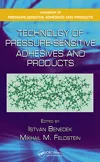Energizing Product Designs with Electrically Conductive Adhesives

Electrically conductive PSAs.
As electronic devices become increasingly smaller and more complex, reducing the size of component space becomes more important. Electrically conductive pressure-sensitive adhesives (PSAs) enable smaller electronic designs through thin, effective bonds because they not only bond components together, but also provide the added functionality of providing pathways for electrical currents. By eliminating the need for other conductive elements, electrically conductive PSAs present options for simplifying electronic device design and manufacture. Electrically conductive PSAs are suited for applications such as electrical interconnections for low-current circuits; splicing conductive materials; bonding electromagnetic interference gaskets; ground plane assembly; and static control for printed circuit boards and assembly.
The days of “glue” simply bonding electrical components have passed. Today’s adhesive systems have evolved into sophisticated polymer formulations capable of delivering reliable bonds with added functionality. For example, electrically conductive PSAs are highly tailored polymer formulations loaded with materials to create conductive properties in the adhesive. The adhesive is then coated onto a carrier/substrate that may also contribute to the tape’s conductive properties in single- or double-faced constructions. PSAs may also take the form of a self-wound transfer adhesive.
Creating Conductivity
When uniformly dispersed, conductive particles create pathways within the adhesive matrix to make contact from one surface to another. The conductive fillers may comprise a number of materials, such as nickel, silver, carbon, or a combination of these. The adhesive matrix may be formulated from silicone, acrylic or rubber polymers to ensure maximum flexibility and compatibility with metal, film, and potentially low-surface-energy substrates.Adhesives Research Inc., a leader in the development of electrically conductive adhesive technology, has been designing, developing and manufacturing leading-edge, electrically conductive adhesive products for over 20 years. The company's electrically conductive PSAs are based on a patented homogeneous carbon-based adhesive technology that delivers exceptionally stable bonds to electrical contact points, even under extreme stress. The bonds are particularly reliable because the conductive particles within the adhesive form strong carbon chains for good point-to-point conductivity. The chains are flexible, allowing for movement with the adhesive as it expands or contracts against bonded substrates during temperature changes. This flexibility results in uninterrupted electrical contact for reliable electrical interconnections.
Depending upon the application, a number of adhesive or film formulations can be created in combination with the carbon particles to achieve the desired outcome, including carbon-filled adhesive matrix; carbon- and metal-filled adhesive matrix; carbon and silver compound adhesive; adhesive-embedded composites for X-Y vs. Z conductivity control; and conductive films and laminates.
The carrier or substrate can also play an important role in the conductive performance of the adhesive system, or it can address specific design challenges, like the metal foil or fabric substrates used in EMI shielding gaskets and seals. A number of specialized substrate materials are available, ranging from plastic films to galvanized foils and metallized fabrics. Today, design engineers have more material choices for conductive substrates than ever, including metal-coated polyesters, metal-plated mesh fiber and carbon mesh.

Shielding tapes.
Performance is Key
In recent years, advancements in conductive PSAs have enabled formulators to tailor the adhesive’s physical properties for resistivity, conductivity and a number of environmental stresses, including shock and moisture resistance. For example, the Adhesives Research conductive technology can achieve Z-axis resistances from a few milli-ohms to a few ohms, and can be produced in thicknesses of 25-100 microns. This technology is also proven for use in fine pitch connections where X-Y isolation is critical, and it provides reliable connections down to 300 x 300 microns.As applications for electronic devices broaden, the adhesives in these are also required to withstand a wider range of harsh environmental conditions, including significant humidity and temperature fluctuations. Adhesives Research’s technology demonstrates stable bonding performance through temperature cycling (-20-85°C) and up to 95% relative humidity. The adhesive system can also be tailored to provide a degree of removability, which is important for parts requiring re-work during the manufacturing process.
Design engineers should consider the process and handling benefits of PSAs when selecting an adhesive for their product designs. PSAs form instant bonds, and provide reliable electrical contact without mechanical pressure or cure times. Because these adhesive systems are manufactured in a continuous web format, rolls can be manufactured into wide roll formats, or slit to specified widths, lengths or sheets, and further converted into die-cut components. The manufactured PSA rolls are easy to handle and process, with no messy cleanup required.

Table. Applications
Applying the Technology
Electrically conductive PSAs are sought out for a number of applications, including electrical interconnection and assembly, EMI/RFI shielding and grounding, and static dissipation and control in a range of electronic, medical, and pharmaceutical applications. Examples of Adhesives Research’s electrically conductive technology are listed in the Table.Electrically Conductive Bus Bars for Photovoltaic Modules
An area where interest for conductive adhesives is growing is thin-film photovoltaic modules (PV) for solar-energy applications. In thin-film PV modules, the electrical current generated in the module’s semiconductor is extracted by contacts on the front and rear of the cell. Widely spaced thin metal strips, often referred to as fingers, transport the electrical current generated within the cells to a larger metal bus bar strip. The purpose of the bus bar is to efficiently gather the electrical current from the individual fingers and transport the current from the solar module to a nearby junction box.ARclad® 90038 is a 2.4-mil, highly conductive PSA tape featuring a 1-ounce, tin-plated copper foil backing that demonstrates excellent conductivity and corrosion resistance for bus bar applications. Rated UL 510, this tape features Adhesive Research’s patented homogenous conductive adhesive technology that forms exceptionally stable, conductive bonds to electrical contact points even under extreme environmental stress. The adhesive-coated foil tape construction offers a clean, easy-to-use format for efficient application, unlike copper ribbons and conductive adhesives or epoxies that require a two-step bonding process.
Adhesives Research also offers a range of PSA products to compliment ARclad 90038 for a number of PV module applications, including electrical interconnections, wire management, bonding and assembly, and encapsulation.
Conclusion
Electrically conductive adhesives provide bonding performance and conductivity - two desirable features as electronics become smaller and more complex. Standard electrically conductive adhesive products are available, but Adhesives Research finds that most design projects begin with a base technology that is then customized for each application. Some aspects of the adhesive system that can be tailored by application include: adhesive performance properties and formulations; finished thicknesses (25-150 microns); and substrate and release liner material selections. The conductive properties of the adhesive itself can be tailored to range from 1 milli-ohm to 10,000 milli-ohms depending upon the needs of the application. Development work continues to push the technology envelope for conductive adhesives, including the combination of these with conductive films, coatings and inks for added conductive capabilities.About the Author
Deepak Hariharan is the Electronics Business Manager for Adhesives Research Inc. Hariharan has a Ph.D. in chemical engineering from Purdue University, a degree in chemical engineering from the Indian Institute of Technology, and an MBA from the University of Maryland.For more information about Adhesives Research Inc., phone (800) 445-6240 or (717) 235-7979, or visit www.adhesivesresearch.com.
Links
Looking for a reprint of this article?
From high-res PDFs to custom plaques, order your copy today!





